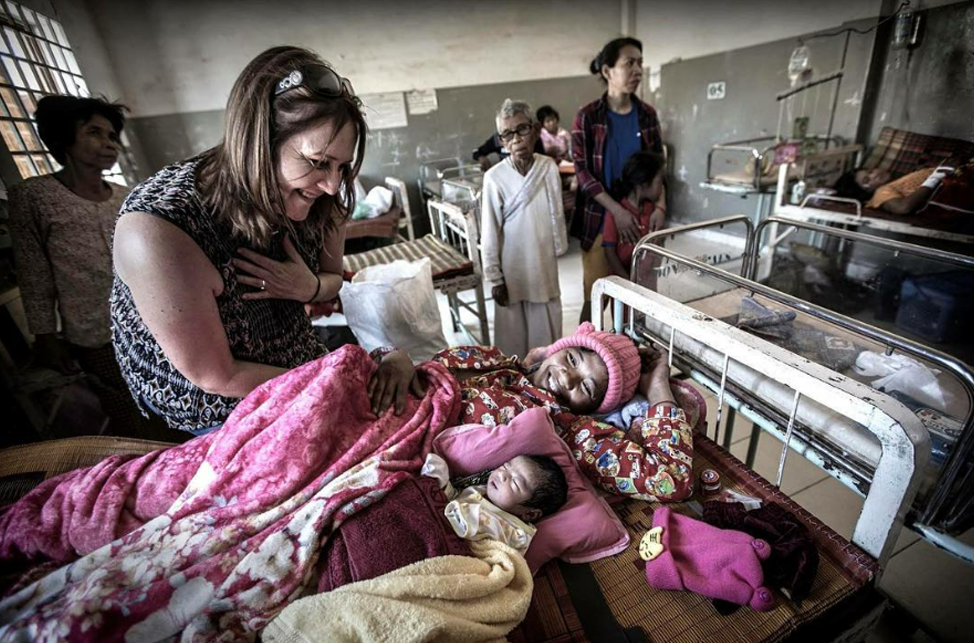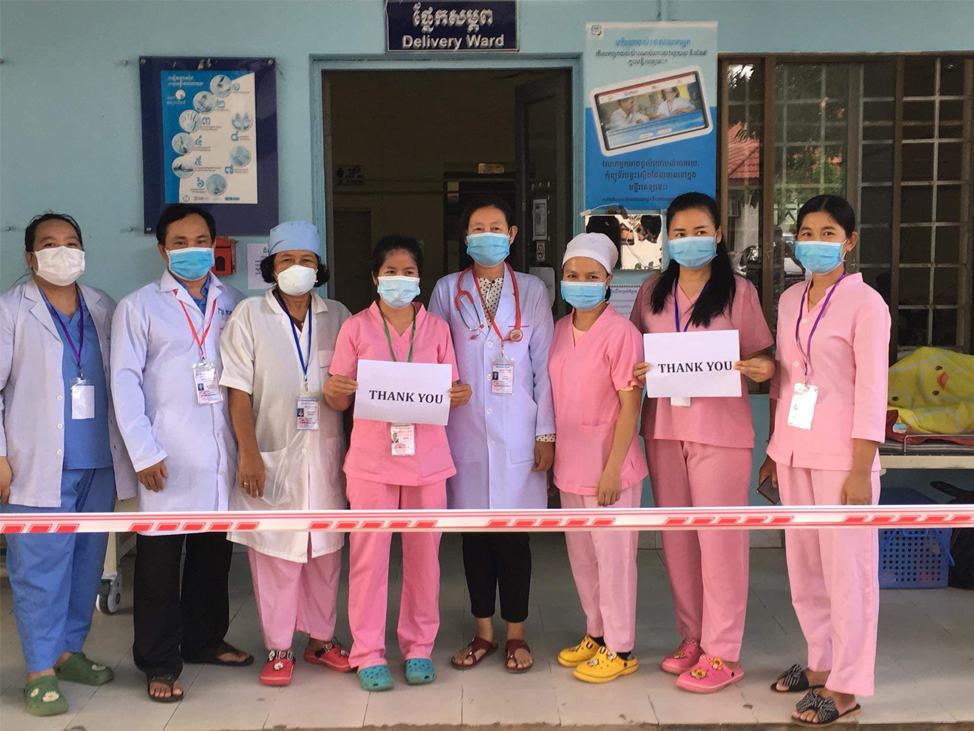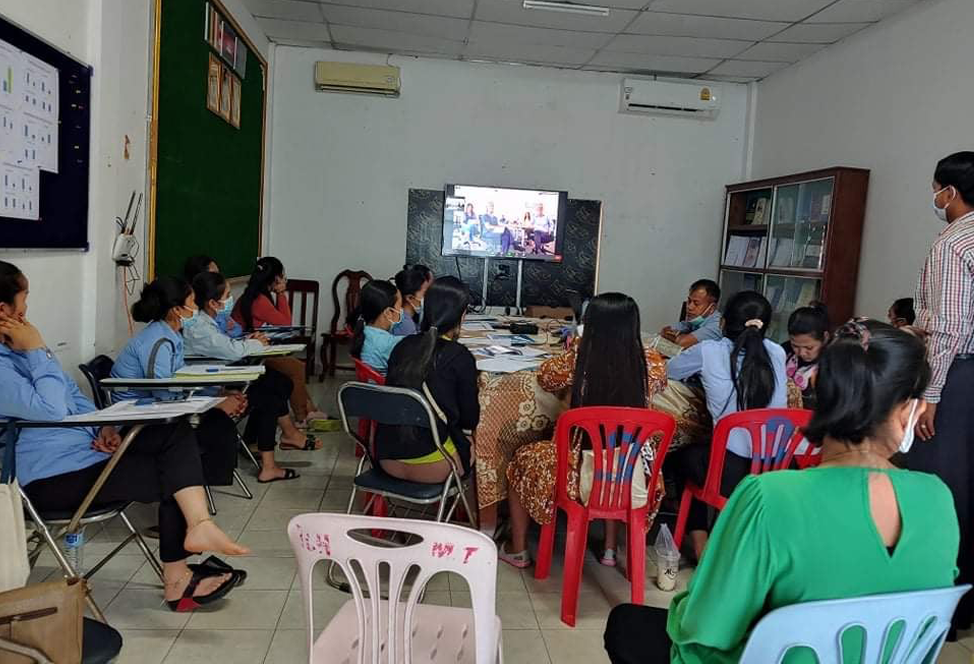31 May 2022

Kate Taylor
Founder of The 2h Project
Bachelor of Midwifery
It was while volunteering on a floating medical clinic in Cambodia that Kate Taylor made the decision to study a Bachelor of Midwifery at UniSA. Not long before, Kate had gone through a traumatic experience while giving birth to her eldest son. With medical intervention Kate survived, but only because of where she lived. What about the millions of women in other parts of the world who were not so lucky? A spark had been ignited in Kate’s mind that put her on a path that would change her life forever.
‘I knew I wanted to volunteer overseas. With my youngest then just 12 months old, I put myself forward to volunteer at a charity providing health care in Cambodia on floating clinics. At first it was not easy to volunteer, as I wasn’t a teacher or a nurse. I was a stay-at-home mum, so I said to them, if you give me a list of everything I need to do and I complete it, will you let me join?’
A few months later Kate was in Cambodia, volunteering on the floating clinic. ‘Because I had survived pregnancy and childbirth despite complications, I was asked to run the antenatal clinic. I referred back to all the advice I had been given by doctors and nurses in Australia. Talking to pregnant women about the importance of hydration, nutrition and getting help when the time came to give birth. I could see on their faces, that access to these things was not as simple as it sounded. One woman broke down in tears, explaining that her mother had died in childbirth having her, and she was petrified of the same thing happening to her. Seeing how frightened she was made me more determined. It was that moment I decided to go back to get a qualification, so I could really help these women.’
Back in Adelaide, Kate enrolled in the Bachelor of Midwifery at UniSA. With three small children at home it wasn’t easy. ‘Going to university was a challenge, I was a stay-at-home mum, and I didn’t feel I had much school experience to draw on. I had support from my husband and family, but it was still hard. I had to push through and keep reminding myself what I was doing it for.’
With the midwifery course under her belt, Kate’s passion was now armed with a deeper knowledge of antenatal care, as well as giving her a network of friends and colleagues. ‘The course was amazing, and I’m still in touch with people from that time. I remember my lecturers’ encouragement to live out the dream I had to get back to Cambodia.’ Following Kate’s graduation, a classmate and senior lecturer joined her on her first trip back. Little did Kate know that this crucial time spent on the ground with her friends and former teacher would become the seeds of The 2h Project.

Over twenty years later, The 2h Project under Kate’s lead as Founder, has developed and helped thousands of women survive childbirth. The project organises voluntary Australian health professionals to fly out for trips, to work with their counterparts in Cambodia. Once they land in an area they commit to delivering 21 programs over a two-year period.
Over the years Kate has nurtured partnerships in Cambodia with the Cambodian Government, Provincial Health Departments, National Maternal & Child Health Centre and the Cambodian National Midwifery Association, all who now recognise The 2h Project’s programs as a benchmark for educational midwifery standards across the country.
In fact, it is now the Cambodia Government who advise which regions are next in line for program delivery, and provide data for that region in advance. ‘Every area is different and the data we get beforehand is critical in understanding things like access to a clinic; are there rivers, mountains, clear roads – factors that become critical for managing a birth.’

In true ‘glass-half-full’ fashion, Kate found a way to enhance the program during the COVID-19 pandemic. ‘At first it was a challenge when we couldn’t travel, but the lockdowns gave us time to redesign our training, create online conversations and deliver courses through videos and webinars. These resources now enhance our training and can be drawn upon by the midwives when we are not face to face. Whilst this has had an impact, it’s still the friendships and partnerships we make on the ground that I’m most proud of. It’s not us and them, we’re a team!’
The excitement in Kate’s voice is evident when she talks about the first trip she’ll make to Cambodia since 2019. ‘This December we have a midwifery and obstetric team heading back to Pailin, and we’re also commencing new training in Ratanakiri. Ratanakiri is a remote province in the northeast of Cambodia off the tourist track due to its mountains, plateaus, rivers, and crater lakes. Due to its remoteness, it is one of Cambodia’s least developed provinces, and we are so excited to be able to work alongside the midwives and obstetric teams there.’
It’s easy to think that Kate might not have much time for anything outside of her work in Cambodia, but despite all her commitments, Kate is also a senior lecturer in midwifery, and on the weekend works clinically. ‘My husband also works for 2h, so when we can, we love to spend time with the family. Our three boys are grown up, the youngest who was 12 months old when I first travelled to Cambodia, is now 24 years old!
‘All these years later it’s still just as rewarding to journey with people who have the same passion as me. In fact, one of my daughters-in-law studied nursing at UniSA, and has just completed her midwifery – so the family are getting more involved too. Looking back, if I could say anything to my younger self, I’d say – ‘dream big and go hard, because anything’s achievable if you are passionate and dedicated.’



